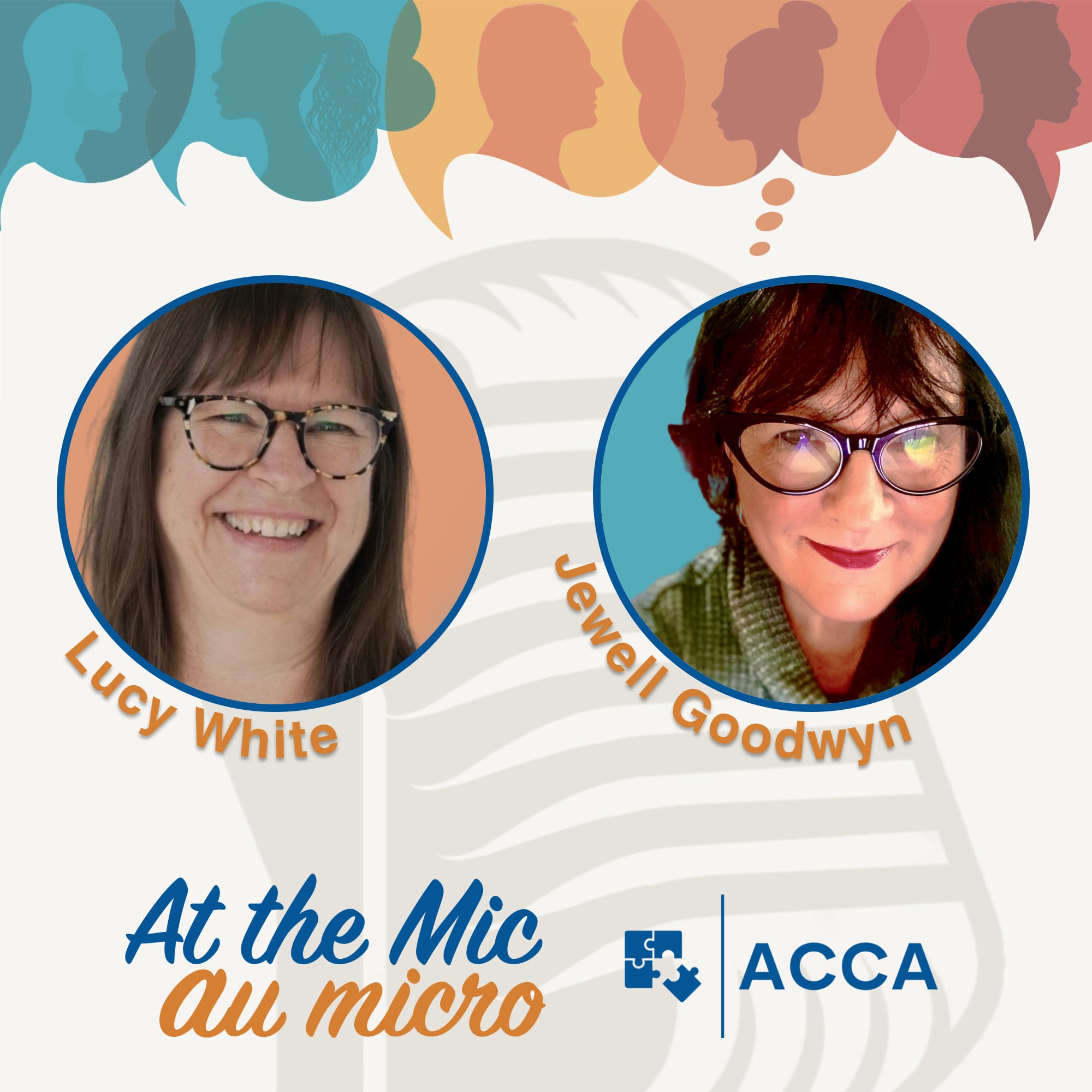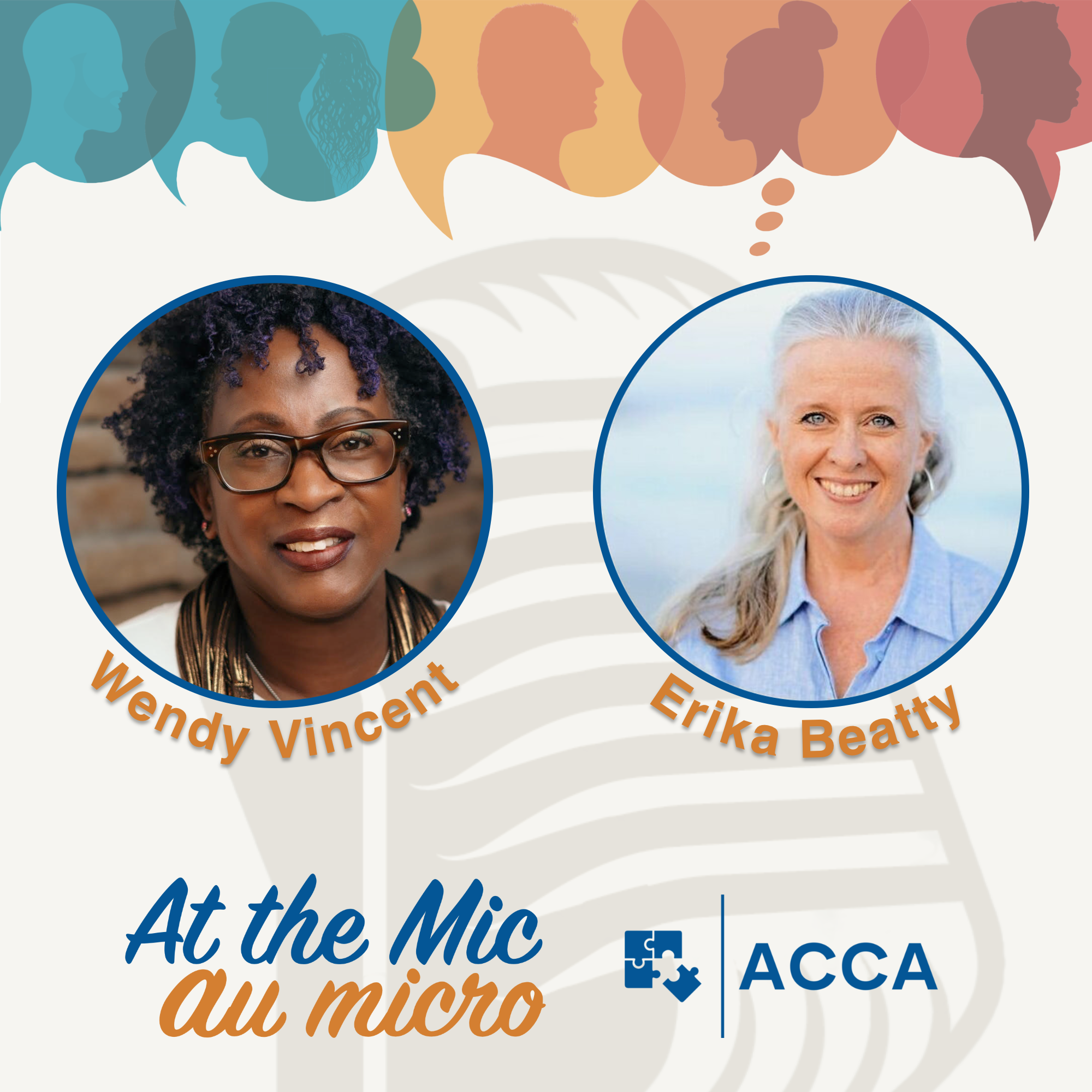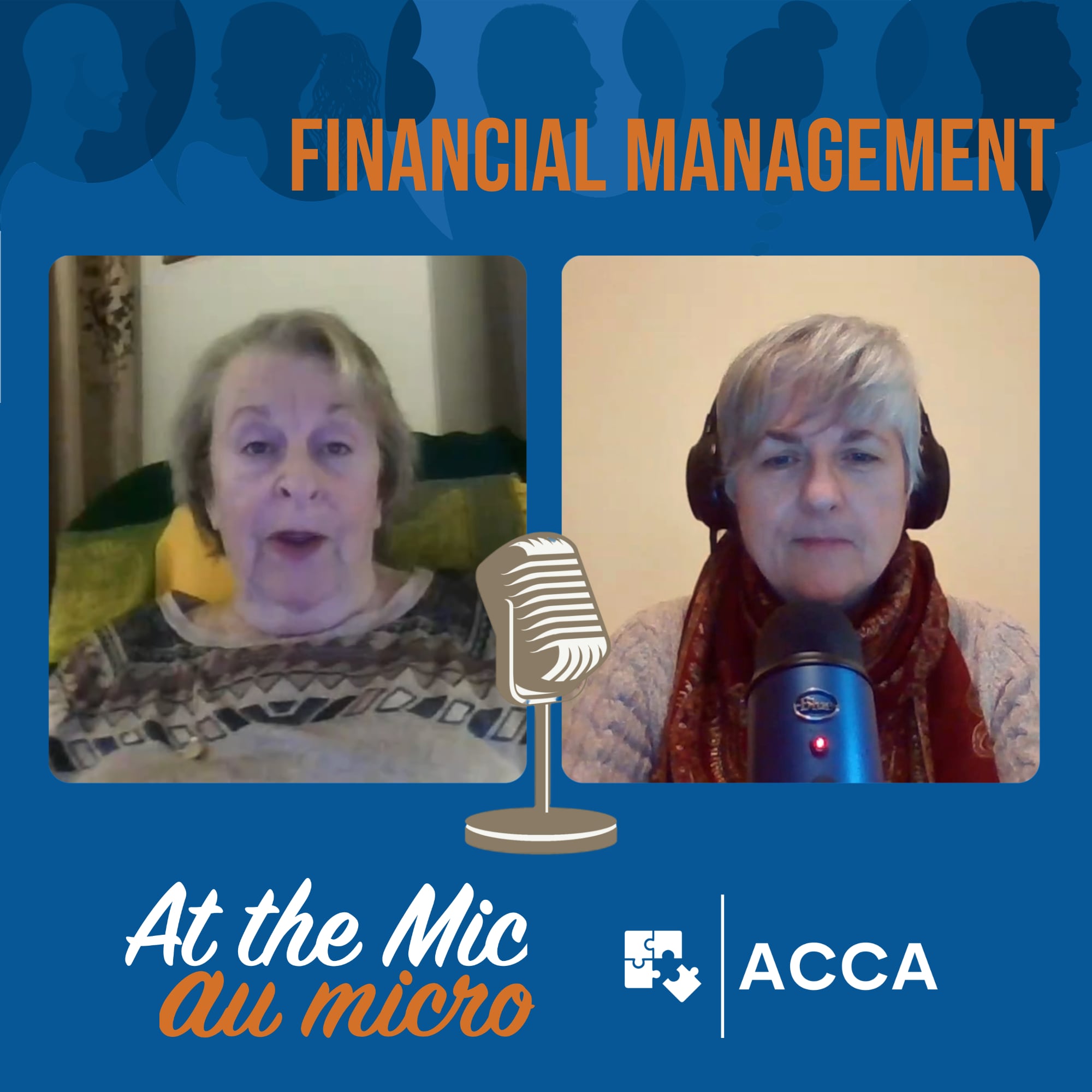ATM002 - On Leadership Coaching - Transcript
[00:00:00] Lucy: With coaching, the impact is immediate. When you're following the energy in a coaching conversation, you know when the person really has an insight, you know when that person's impacted by what's going on in the conversation.
[00:00:34] Victoria: Hello and welcome to the second episode of At the Mic, a podcast brought to you by Arts Consultants Canada, l’Association des consultants canadiens en arts. In this edition of At the Mic, we bring you a conversation on the value of leadership coaching with guest Lucy White and moderator Jewel Goodwyn. Arts Consultants Canada acknowledges the support of the Canada Council for the Arts for this podcast series./Nous remercions le Conseil des Arts du Canada pour son soutien à cette série de balados.
Lucy White is a certified coach and cultural executive with over 30 years experience. She crashed her first Arts Consultants members’ meeting in 2013 when employed full-time as an executive director of the Professional Association of Canadian Theatres. Now as a principal with the Osborne Group, Lucy serves as interim executive director for non-profit organizations amongst other projects. Recent cultural sector clients include Koffler Centre of the Arts, Norm Foster Theatre Festival, Gardiner Museum. Thunder Bay Symphony and Orchestras Canaday
Lucy's long-term interest in personal and professional development, led her to study mindfulness practices, proactive coaching, and to become a certified positive intelligence coach. She offers mental fitness for non-profit leaders as well as individual coaching.
Based in London, Ontario, Jewel Goodwyn has worked in the arts sector for nearly three decades, most notably as a national leader in the artist run centres community. During her over 20 years as president and founding Executive director of Artist Run Centres and Collectives of Ontario, she collaborated with fellow arts service organizations to form a provincial coalition to strengthen and increase public investment in the arts in Ontario.
Since 2020, Jewel has served as an artsfest mentor for Business of the Arts and worked with over 30 arts administrators nationwide.
She's committed to cultivating environments that are equitable, inclusive, and respectful. Her areas of expertise include organizational development, board governance, strategic planning, profile building, and network building.
And now here are Lucy White and Jewel Goodwyn.
[00:02:48] Jewel: Hello, my name is Jewel Goodwyn, Principal of JR Goodwin Consulting. I've been a member of ACCA since 2020. I'm particularly keen about today's topic, leadership coaching. I'll be your host for this episode. Now I'd like to welcome Lucy White of Lucy White Coaching and Consulting.
Welcome, Lucy. Thank you for joining us today to talk about leadership coaching.
[00:03:14] Lucy: Thanks, Jewel. I'm excited to have this conversation. I love talking about coaching and consulting.
[00:03:20] Jewel: Well, it's a real treat to be talking with you this afternoon. I was just recalling how long we've known each other. Must be going on 20 years. We originally met as leaders in the ASO community meeting up at Parliament Hill in Ottawa to advocate for a national art community through the Canadian Arts Coalition. And now here we are with different hats on.
[00:03:43] Lucy: It's pretty shocking that it's been, 20 years since I've known you. And I was thinking about an Arts oalition meeting, that I had with, Christina Lowen, who still runs the Association for Opera. And, Justin Trudeau when he was a baby MPP or MP, and he was so relaxed and laid back and, I don't think he's probably quite the same now as Prime Minister.
[00:04:09] Jewel: That is pretty cool. Now, I've been intrigued in following the arc of your career as a consultant, and I find it amazing that you are interweaving three different components, all dealing with leadership, perhaps not so incidentally, into your practice as a consultant. Can you begin by taking us on the journey of how your consulting practice evolved into a three-pronged approach, which includes consulting, interim leadership, and coaching.
[00:04:41] Lucy: That's a great question, Jewell. Thank you for asking because for many years I thought my career was completely random. I just went from one job to another. But leadership, and professional development for leaders has been a thread all through my career. I was the Executive Director of the Professional Association for Canadian Theatres, and when that job was coming to an end, I wasn't really sure where I wanted to go next.
I was encouraged to think about consulting and honestly, I didn't really see myself as a consultant, until I heard about the Osborne group where I could, work independently, but within an umbrella. So, I have the best of both worlds there and I get to do consulting projects like strategic planning, working with boards on their governance issues, operational issues, that kind of discreet project. And it was the Osborn Group that identified, interim leadership as a possibility. I have many years working in cultural associations and so I can come into non-profits of all kinds and work as interim executive director when there's a gap to be filled often a pretty short gap.
In that role as interim executive director, there's often a crisis that precipitates my coming in. It might be they can't find someone to replace a vacancy. It might be someone, an executive director becomes ill and has to leave suddenly or somebody resigns. After I've been there a few weeks, there's usually this moment where staff start to come into to the office and ask me “What's going on with this organization? Am I in danger of losing my job? Are we folding? What's going on?” And so, I found myself having, what I conceived of as coaching conversations. I started to be uncomfortable with that because I didn't have any training and I really didn't know what I was doing as a coach, and I was worried that I might actually be causing more harm than good. So at that point, I went out and got some coach training and immediately fell in love with it because it's a completely different dynamic than consulting. It was so immediate and had such an obvious impact for my clients that I thought, okay, this is not only a great tool to have as an interim leader, but also this is an additional offering that I can have as a consultant. I can add that to my portfolio, and that is probably where my career is moving in future.
[00:07:25] Jewel: Well, this is pretty amazing. Do you ever find that you're wearing all three hats at once, because that's quite a bit of expertise and quite a gift for your clients because of the level of skill you bring? How does that work, Lucy?
[00:07:39] Lucy: Well, I absolutely do end up wearing all three hats at once. I'll give you an example to illustrate what can happen. I'll be working, as an interim executive director and a large project will come up and I might tackle that because I have the expertise. So, something like governance work would fall into that category. And the other day I actually I had a conversation with a board chair and I wasn't really sure what she was trying to learn, or I had this feeling through the conversation there was there was something underneath the conversation we were having, and so I switched into coach mode to find out what is the real information she wants that is underneath the conversation we were having and that was incredibly effective. And at some point, we started laughing at when she realized what was going on, I said, Yes, I am definitely in coach mode right now. And it was very effective. So, I can wear all those hats. The key for me is I need to know what hat I'm wearing and not to confuse the different roles.
Especially when I switch into coaching mode, I will most often ask for permission first, when I realize it. The minute I realize it, I'll ask for permission because it is a different kind of relationship, than a consultant relationship.
[00:09:01] Jewel: Can you tell us about coaching and how you define it differently from consulting?
[00:09:07] Lucy: It's a common question and I think people do get confused about what coaching is, and they typically confuse it with mentoring, but also it absolutely gets confused with consulting. So, here's how I think about it. When I'm hired as a consultant, people are identifying that I have the expertise and the experience that they want to solve a problem that they have. So, they're hiring me for my expertise, meaning they're hiring me to come in and solve a problem, to tell them what to do. Now, of course, I'm not doing that without their input and so on, but essentially, I’m being hired for my opinion, and my expertise on the problem they have. So, it's very problem focused.
Mentorship is really similar. Someone's coming to you for your expertise and your experience, they're asking you, “What should I do?” It's very problem focused, but typically the problem is the other person's career. And so, as a mentor, you're often helping them with specifics, or generalities but it's problem focused.
In coaching mode, you are focused on the person and you are hired for your ability to ask questions and to elicit the other person's potential. So, you're focused on the person, not the problem and we often say in coaching, coach the person, not the problem. And so, rather than tell people what to do, what I do, through active listening and other techniques, is find out from them what they think, what their inner wisdom tells them to do, what their personal values are, and how to move forward in alignment with their values. So, I'm not being asked for my advice or my opinion. I'm being hired for my ability to see the other person's potential and to bring it out.
[00:11:06] Jewel: Can you tell us about different kinds of coaching?
[00:11:10] Lucy: Coaching has really exploded in the last, I'd say, 10 years. Certainly it had been around in the for profit sector for a long time, and we all think we have an understanding of executive coaching. But over time it has expanded to the point where you can find a coach that has a niche, no matter how narrow it is, and I'll often make the joke about, if you are a left-handed bagpipe player there's probably a coach that can work with you on the specifics of that. Having said that, there's some main areas of coaching that I think are, are interesting. So, the first one would be executive coaching. That's the one I that we think we're familiar with. And executive coaching is about working with the, most senior individual in an organization. In doing that, you're still coaching, but you're very much focused on that individual, his or her performance, and whether their organization is performing at its best. So, it's very focused on the objectives around the person's work as a CEO or CFO, Vice President, whatever that level.
When we talk about leadership coaching, which is one of my areas of interest and one of my specialities, what we're really talking about is bringing forward a person's leadership potential or addressing their leadership challenges. Slightly different than executive coaching in that it's less concerned with the organization's performance, and again, focused on the individual, but it also can bring in their team. So the person might be currently a leader, but they also might have aspirations to improve their leadership skills, bring leadership to their team, get promoted or move into a different phase.
I'm very interested in working with non-profit leaders who were going through some kind of transition. It might be moving into retirement, it might be getting ready for a new role in their organization, it might be, getting ready to switch, organizations entirely. Another area that I look at a lot in leadership coaching is the relationship between my client and their board of directors or their staff, because relationships are often quite difficult to navigate and so we turn our attention to that kind of issue with leadership. The other area that I work in, is what I would characterize as whole person coaching, and I do have a whole person approach in all areas of my coaching.
But let me talk a little bit about what whole person coaching is. When someone comes to me for one-on-one coaching, I will go, through an assessment process with them where we look at all the areas of their life. The reason we do this is that my belief is that when you're in a coaching, session, you really have to be prepared to go where the client leads you. Whether that is, interest in improving relationships, interest improving financial situation, health and wellness, we can talk about their physical environment, we can talk about spirituality. Nothing that isn't on the table in a whole person approach. So that's my approach with all my clients, whether I'm doing executive coaching, leadership coaching, or just one-on-one life coaching, because I think that's the only way that coaching is really, really effective.
[00:14:40] Jewel: You wrote a great article earlier this year titled Strength and Mental Fitness by Understanding Push versus Pull. Some might be familiar with the phrase push versus pull with muscle training and fitness regiments. Lucy, can you talk about push, versus pull and mental fitness training?
[00:15:03] Lucy: Mental fitness is a particular kind of coaching, which has as a framework that everyone just through the process of living and growing up and living develops certain internal negative voices. This is evolutionary. We are, programmed, we're hardwired in a way to be cautious, to keep us safe. So, as we're growing up, we have, moments, where as children were thinking, “What do I need in this moment to, to stay safe?” And so those moments where our inner voices tell us to, be cautious, or other kinds of adaptive behaviors, they get so strong that as adults, we don't need them in the same way and they actually become counterproductive.
So, we call those inner voices, saboteurs. In the process of working through the mental fitness program, what we do is we literally work with our clients to rewire their brains. And this is neuroplasticity at its most simple. So, I don't pretend to be a scientist, but my understanding is, when we go through the process of strengthening our positive mindsets, and we have processes to do that, then those neural pathways actually start to shift so that the positive neural pathways become stronger and the negative neural pathways become weaker.
This all sounds kind of crazy in the abstract, but let me give you an example. So I have a very strong avoider saboteur. What that means on a really practical level is if I have a big project coming up, I will often do anything I can to avoid sitting down and doing the project. My avoider saboteur will have me clean the kitchen, make meals, I will even iron or vacuum, two things that I really hate, to avoid having to confront the inner negative voice of, “it's too hard. It will take too long. You're too stupid to do this. You don't have the knowledge.” All those negative voices. But Since I've been practicing mental fitness, what I've found is that I can, weaken that negative voice, I hear it still, it never really goes away. I can reduce it to the point where I can ignore it and get on with my day because I'm starting to develop positive inner voices that say things. “Okay, you've never done this before, but you're smart. You can figure it out. Or actually, if you sit down for five minutes, you're gonna discover that you have lots of energy to complete this task.”
So, we're moving our clients through the mental fitness, program from that negative mindset to the positive mindset. It's about six weeks to make a difference because, just like at the gym, and although I don't really know anything about fitness, I do know that you don't build those muscles on one trip to the gym.
So, people who say, “I've tried those things, they never work,” have probably not done them consistently for a six-week period of time. Because if you go to the gym every day for six weeks, you are definitely going to be stronger and fitter at the end of that six weeks. You're not, if you go once. So, it is the mental fitness process is a commitment, but I have to say for me personally, it has completely changed my life. I wouldn't be on this podcast right now. Two years ago, I would've said, “No, I can't do that. I'm not smart enough. Nobody cares what I think.” And now I know that I actually have expertise and something interesting to talk about and so here I am. So, I really think it, it works and I'm a big fan.
[00:18:45] Jewel: Could you expound on the push versus pull in that training?
[00:18:51] Lucy: Yes. I get so excited about mental fitness I forgot the original question. Okay, so thank you for reading that article. That seems to be a very popular article because most of us have a sense of the difference between when we're being pushed to do something and when we're in “flow”where things are easy and we, we talk about that as pull.
Let me tell you how they're different. And I'll use an example. One of the saboteurs that's very common in leaders is the, hyper achiever saboteur. The hyper achiever saboteur is that voice that says “you're nobody if you don't have a degree. You are nobody if you don't have a MA. You are nobody if you don't have a PhD. You can see where I'm going with this, which is that saboteur is never satisfied. You have to do more. You have to have more credentials, you have to have more qualifications, and so it is constantly pushing people who have a strong hyper achiever saboteur, constantly pushing them into greater, more, better achievements. What they fear underneath it is that they're not worthy without those achievements. That they're not worthy just for who they are. So, the hyper achiever saboteur is telling you, “do more, get more credentials, get more qualifications.” That's really different, really qualitatively different than sitting down and saying, “What do I want to achieve in the next couple of years? Would I like to do, a master's in this area that interests me, Would I like to go out and get a credential, like maybe get my HR credential? Is it time for me to finally run that marathon?” And the reason it's pull, rather than push is that you are being drawn to it because of a value or a wish, a desire that you have. And it feels different because you are being pulled by your internal motivation in a positive, easeful way. Which isn't to say that if you do something from that, perspective, it's going to be super simple, super easy. It's more of a sense of an easeful approach to something that you want to achieve.
So, when we're looking at push versus pull, really simply, are we being pushed from fear based motivation or are we being pulled by desire based, value based motivation? So that in a nutshell is the difference between push versus pull. So, your saboteurs push you and that inner wisdom values based, and for shorthand, we call those sage wisdom is the one that pulls you with ease and flow towards, the life that you want to have.
[00:21:49] Jewel: I love that, Lucy. Now, I've been interested in pursuing some training to become a coach. As a lot of consultants listening in today might be too. Are there some good resources you'd recommend?
[00:22:02] Lucy: When you're thinking about getting coach training, the place to start is what kind of sector do I want to work in? What kind of approach do I want to take? And you can look at many, many different coaching schools, there's so many really great ones. And get a sense of, do I want to take a psychology based approach? Do I want to take a mental wellness, approach? Do I want to bring in some of my interests like fitness or do I want to come at it from a point of view of the sector I worked in? And then once you've figured out essentially what kind of approach you want, you can look for schools. And then the second thing to do is to go onto the International Coach Federation website and see if that's an accredited school, because that's your quality control to know whether this school is going to give you the kind of in-depth training you need, because like everything you can go online and buy a coaching certification, just by putting your money down. But to actually get training, the coaching training I did was 104 hours and that was just the beginning. And then if you want to go further, you can go down the credentialing path and it is going to be dozens and dozens and dozens more hours.
If you're just wondering can I use a coaching perspective in my work as a consultant or with a team, the book that I recommend the most often is called The Coaching Habit. It's by a fellow named, Michael Bungay Stanier, we'll put this in the show notes so you can find the link. Michael is an Australian guy, but he lives here in Toronto where I am. He's super smart, very funny, quirky. He really knows his stuff and his books are incredibly accessible. So, I would recommend The Coaching Habit by Michael Bungay Stainer as a first step. And I have joked before that if you don't like Michael's book and it doesn't make sense to you, then you probably aren't going to be a coach, because from my perspective, it’s really accessible.
There are lots of free resources online, places like the International Coach Federation, and organizations like that that can give you background materials, like what's the ROI on coaching. what are the coaching perspectives you might take and, Harvard Business Review, talks a lot about coaching and there's some really good resources there. So, they're out there if you want them. I would just say, take a minute, make sure you're looking at, a legitimate, coach or legitimate coaching organization before you just sign up.
[00:24:44] Jewel: Thank you, Lucy. That's a wealth of resources to tap into and I signed up on LinkedIn to follow Michael Bungay Stainer, so thank you very much. If someone is interested in working with you, Lucy, you've got a few training programs that are coming up in the new year, how do they get in touch?
Thanks, Jewel. I appreciate you asking. So I offer one on one coaching. My specialty area is working with non-profit leaders, and if you are interested in that, you can go to my website, www.lucywhite.ca, and I will tell you, That my therapist came up with that marketing name. She said, How do people know you?
[00:25:29] Lucy: Thanks, Jewel. I appreciate you asking. So, I offer one on one coaching. My specialty area is working with non-profit leaders, and if you are interested in that, you can go to my website, www.lucywhite.ca, And I will tell you that my therapist came up with that marketing name. She said, “How do people know you?”And I said, Just by my name. So that's what I went with. On there, you can, sign up for my newsletter, which is infrequent. I don't get to write as often as I would like, so you won't get bombarded. You can find the link to my calendar and you can sign up for a free 30 minute conversation with me to ask your questions about coaching, see if we're a good fit.
On my website there is information about the mental fitness program that I offer. There's a free webinar that'll come up in January. I haven't fixed the date yet. And the course will also start the end of January. It’s an eight week course. There’s pricing for people in the non-profit sector. I'm always available through my email address,
[email protected]. So if you want to talk to me directly, you can that too.
Jewel, I'd like to make a special offer to the listeners of this podcast. In the Show Notes, we'll include the link to the Saboteur Assessment, and once you've done that, if you want to take me up on the offer of a free debrief on the assessment, please get in touch with me through my website.
[00:26:40] Jewel: That's great. That's a generous offer, Lucy. Thank you so much. This is my last question for today. What is it, Lucy, that you love most about the work you do?
[00:26:52] Lucy: It's taken me a long time to understand the particular way in which I like to help and to be of service. Coaching allows me to do that in the most immediate way. Consulting is interesting, intellectually interesting. I meet lots of great people. I feel that I did do high quality work for them, but, when the consulting engagement is over, you don't really know whether your recommendations, your reports are ever going to be implemented.
With coaching, the impact is immediate. when you're following the energy in a coaching conversation, you know when the person really has an insight, you know when that person's impacted by what's going on in the conversation people will often say things like, Wow, I never saw that before, or, I didn't realize that that was true, or I didn't realize that I had this crazy belief that was unexamined. You get that immediate feedback and it's very, very rewarding to, to me, to see how much coaching, can help a person move into the kind of life they really want.
[00:28:10] Jewel: Thank you, Lucy. Thank you again for joining us today on At the Mic and talking with me about leadership coaching. That was wonderful.
[00:28:20] Lucy: Thank you. It was great to talk to you. I really enjoyed.
[00:28:22] Victoria: And that wraps up our second edition of At The Mic, a podcast of Arts Consultants Canada.
For information on Arts consultants and our members, please check us out
[email protected]
To send us feedback or questions on anything you hear in this podcast series, please email us at
[email protected]
And remember to check our Show Notes in this podcast for links mentioned during the program as well as a transcript.
Et noter bien que quelques épisodes seront en français et nous offrons accès à un service de traduction de ne rien manquer!
Thank you so much for joining us on At the Mic. Remember to subscribe to this podcast on Apple Podcasts, Google Podcast, Spotify, or wherever you find your favorite podcast.
Until next time, and thanks for listening. À la prochain.






